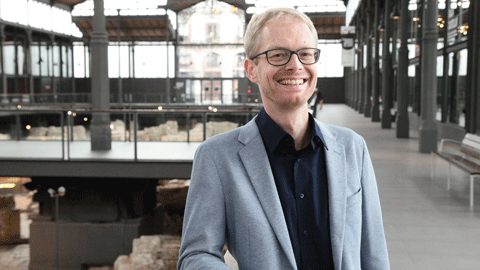"In Spain the Caciques have often been members of parliament"

20/12/2017
Jens Ivo Engels, lecturer at the TU Darmstadt in Germany, offered a speech entitled "Political Corruption in Contemporary Europe: state of the question, debates and current lines of research" at the opening of the first International Conference on Political Corruption in Contemporary Spain (19th-21st centuries), which took place on 14 and 15 December at the Born Cultural and Memory Centre in Barcelona. The conference was organised by the UAB Parliamentary History Group, the Born Cultural and Memory Centre, the Institute of Past Presents of the Barcelona City Council, the Barcelona Provincial Council and the UAB Institute of Political and Social Sciences.
Since when is the history of political corruption in Spain studied?
What is mainly studied in Spain is the history of Caciquismo since the beginning of the 20th century. However, the authors of these studies did not see themselves as historians on corruption. This is something new that appears between 2005 and 2010, when the history of corruption becomes a new historic research field.
Has democratic progress contributed to reducing the phenomenon of corruption?
No, because there is no corruption phenomenon: there is a discourse on corruption and different types of practices. In fact, democracy and parliamentarism have consolidated many exchanges of favours and clientelism because, once there are members of parliament, the game counts with new players. In Spain the Caciques have often been members of parliament or have had very close ties with parliamentary members. And that also goes for the rest of countries in Europe.
Have constitutional monarchies historically been more corrupt than republican countries?
In pre-modern societies, before the French Revolution, personal patronage was fundamental for all political organisation: the very idea of monarchy is aristocratic and therefore is based on personal ties. And in modern systems we have tried officially to fight corruption both in monarchic and republican systems. Monarchists consider that the only incorrupt person is the king; dictators say they are the only ones who are not corrupt; and so on. All systems declare that they fight corruption officially, but these practices have always existed.
In your conference you spoke precisely on the use of an anti-corruption discourse used by dictators. In the case of Spain, the dictatorships of Primo de Rivera and Franco are said to have been especially corrupt.
Yes, of course. Each system uses forms of patronage and clientelism, and this also happened in case of Francoism, Nazism and Fascism in Italy. They say they want to fight corruption, but then use structures similar to those which existed before.
When did journalism become an effective tool in denouncing political corruption?
Since the beginning of modern journalism, with the development of mass press in the last third of the 19th century. The "scandalisation" of corruption begins at the same time as other types of scandals appear.
Is the idea that there is more corruption in Mediterranean countries such as Spain or Italy true?
The exact level of corruption is not known because there is no way of measuring it. However, it is true that northern countries consider the southern ones to be more corrupt and, in fact, Spaniards, Italians and Greeks believe their countries to be the most corrupt. It is something that fascinates me and goes back to long ago: it begins with the Regenerationism in Spain and, in Italy, even earlier with the Meridionalism in the mid-19th century.
What countries have been more effective in fighting corruption?
Prussia was always said to be very effective. The Prussians believed it, the Italians also believed it, but if we look at the records, we can see administrative strategies and practices which are very similar: there is a very good study on the administrative structure of Prussia which establishes that it was very similar to that of southern Italy.
In an article you signed jointly with Silvia Marton and Frédéric Monier you speak of a "tendency to have less tolerance with favouritism". The sensitivity of society towards political corruption has indirectly caused an anti-political reaction?
Yes. In the past two decades there has been a growing anti-political and anti-elite trend which is closely related to the debate on anti-corruption and originated among left-wing parties. At the same time however, the anti-corruption discourse is a neoliberal discourse. There are therefore several reasons which lead to this discourse and all stem from very different interests and ideologies.
Do you think there is a relation between this growing sensitivity against corruption and more votes going towards populist options (Brexit, Trump, Front National in France, etc.)?
Yes, definitely. And we can draw a parallelism between this and debates from the end of the 19th century and beginning of the 20th, when there were discourses against the elite and democracy, more or less like now: there are many differences, but also similarities.
More information:
International Conference on Political Corruption in Modern Spain (19th-21st centuries)